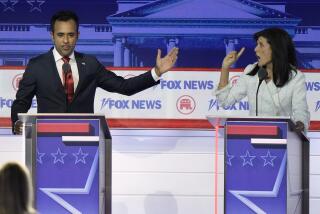Bush, Dukakis Trade Jabs on Foreign Policy : Vice President Aims to Place Opponent ‘Outside Mainstream’
- Share via
UNION CITY, N.J. — Campaigning in a gritty corner of New Jersey, Vice President George Bush said Monday that Democratic presidential nominee Gov. Michael S. Dukakis’ failure to support such military actions as the 1983 invasion of Grenada and the U.S. air strike on Libya in 1986 would place him “outside the bipartisan mainstream” of foreign policy.
To underscore the point, Bush announced that former President Jimmy Carter’s national security adviser, Zbigniew Brzezinski, would be a co-chairman of a national security advisory task force supporting his campaign.
‘The Liberal Governor’
At a noisy street-corner rally in a Cuban-American neighborhood within sight of New York City across the Hudson River, and then at a visit to a Latino food plant next door in Secaucus, Bush challenged his opponent--whom he repeatedly called “the liberal governor of Massachusetts”--to say whether he would also support deployment of the new Trident D-5 missile, the stealth bomber and 15 aircraft carrier task forces.
Dukakis has questioned the need for a naval expansion as great as that of the last eight years but has supported development of the stealth bomber, intended to evade enemy radar.
He also supports development of the D-5 nuclear missile for the Trident 2 submarine, but he has opposed the B-1 bomber, now deployed, as obsolete, and he is against proceeding with the rail-based MX missile--leaving room for his critics to challenge his overall support for the modernization of the “triad,” or the three legs of the nation’s sea-, land- and air-based nuclear deterrent.
Bush, asking whether Dukakis supported these and other fundamental elements of the Reagan Administration’s national security policy, said at the Goya Foods Inc. warehouse:
“If my opponent can’t answer ‘yes’ . . . he has veered outside the bipartisan mainstream, the vital consensus that has been at the heart of America’s national security for many, many years.”
“If he says ‘yes,’ the people are entitled to know why he flip-flopped. And, perhaps most important of all, how will we know he won’t change his position again?” Bush asked, expanding on a theme he had introduced at the noontime street rally.
Added to Economic Message
Bush’s attack was sandwiched at the last minute into the two campaign appearances that otherwise carried an economic message of expanded job opportunities during the last eight years. The busy Latino shopping district along Bergenline Avenue in Union City and the neatly stacked cartons of canned pinto beans, olive oil and papaya in the warehouse formed a picturesque, but incongruous, setting for his message.
The sparse crowd of several hundred Union City residents, waving small American flags, responded with blasts from portable air horns to shouts of “Viva Bush,” and they cheered Bush’s brief reference to the Grenada invasion, which routed a regime backed by Cuban leader Fidel Castro.
Before setting out from Washington, Bush announced the formation of his national security advisory group, which will be led by Brzezinski, former Secretary of State Henry A. Kissinger, who served in the Richard M. Nixon and Gerald R. Ford administrations, and retired Air Force Lt. Gen. Brent Scowcroft, who was Ford’s national security adviser.
Compares Dukakis to Fonda
Brzezinski, who played a central role in the formulation of the Carter Administration’s foreign policy, against which President Reagan and Bush ran in 1980, told reporters after the announcement that Bush’s foreign policy views can be supported by such middle-of-the-road Democrats as Sens. Sam Nunn of Georgia, Bill Bradley of New Jersey and Lloyd Bentsen of Texas, Dukakis’ running mate. “Dukakis’ views are closer to Jesse Jackson’s and Jane Fonda,” he said.
Among the others on the panel are Reagan’s first secretary of state, Alexander M. Haig Jr.; former Sen. John Tower (R-Tex.); Sen. Jesse Helms (R-N.C. ), and retired Adm. Elmo Zumwalt.
On a day in which Dukakis charged that policies favored by Bush on drugs, terrorism and trade had failed, the Republican presidential candidate said sarcastically that the Democratic nominee “is now going to tell us where he stands on the important national security and defense issues.”
Views Called Unclear
Focusing on a number of areas in which he maintains that Dukakis’ views have not been clear--or have shifted--Bush asked, rhetorically:
“Are you now willing to say that you support the action that liberated Grenada? Do you now support the air strike on Tripoli, Libya, as a way of telling (Moammar) Kadafi a lesson, teaching him a lesson and demonstrating to him the costs of continued terrorism?”
(Dukakis has said he would have approved the Grenada invasion if the American students there were in danger. He has said it is still unclear to him whether the students were in danger, however. On the Libya attack, Dukakis would not support targeting Kadafi’s personal home, but “he did and does support bombing the terrorist camps,” Dukakis adviser James Steinberg said Monday.)
Bush continued:
“Are you willing to acknowledge that SDI is neither a ‘fraud’ nor a ‘fantasy,’ and are you prepared to go forward with the testing that is a necessary part of the research?”
More Muscular Rhetoric
The reference to the Strategic Defense Initiative, or “Star Wars” project as it is known informally, follows Dukakis’ more muscular rhetoric in recent weeks not only on the space-based missile defense program but on nuclear issues overall.
Last week, Dukakis shifted his tone, saying that he was “not opposed” to the Strategic Defense Initiative and “obviously” would support testing and deployment if he deemed it “essential to our national security.” Previously, he had voiced sharp criticism of the multibillion-dollar program as a “fantasy” and said deployment would violate the 1972 U.S.-Soviet treaty regulating anti-ballistic missile weapons.
More to Read
Get the L.A. Times Politics newsletter
Deeply reported insights into legislation, politics and policy from Sacramento, Washington and beyond. In your inbox twice per week.
You may occasionally receive promotional content from the Los Angeles Times.










